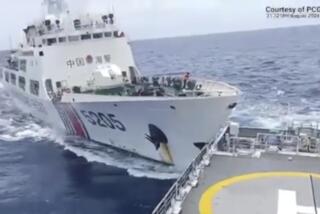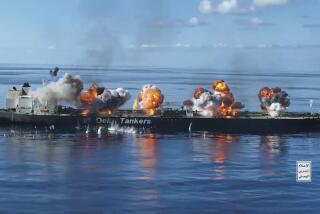Iranian Boats Open Fire on Navy Helicopter
DUBAI, United Arab Emirates â Five Iranian gunboats opened fire on a U.S. Navy helicopter when it flew to investigate them as they threatened to attack a Liberian tanker in the Persian Gulf on Thursday, the Navy said.
A nearby British frigate also launched a Lynx helicopter to watch the gunboats, and there were conflicting reports on whether that aircraft also came under fire from the Iranian speedboats. A third helicopter, chartered by the news media, did come under fire.
Shortly afterward, the British frigate invited the tanker to join a British convoy and escorted it out of the gulf, a CBS reporter on still another media helicopter said.
It may have been the first time since Western warships began protecting shipping in the gulf last summer that one of them had intervened to protect a foreign vessel. Until now, the official policy of the U.S., British and other Western navies in the gulf has been to protect and escort only ships flying their own flag. Shipping executives say that the United States has aided ships from other countries, but the Pentagon has denied those reports.
No injuries or damage were reported in Thursdayâs incident.
Shipping executives, who spoke on condition of anonymity, said it appeared that the presence of the U.S. and British navy helicopters in the area had deterred an attack on the tanker Eastern Power, which was nearby.
âSmall Iranian Boatsâ
The London-based Lloydâs Shipping Intelligence Unit appeared to contradict that, saying the 275,553-ton Eastern Power, a Liberian-flagged ship operated by World Wide Shipping Agency Ltd. of Hong Kong, was fired on later by âsmall Iranian boats.â
The Lloydâs report may have been based on information from CBS news reporter Alan Pizzey, who was in the media helicopter and quoted the vesselâs captain as saying he had been fired upon.
However, a playback of the tape clarified that the captain had actually said: âTen minutes ago, Iranian gunboats approached to shoot, but I have no casualties and no damage.â
Pizzey said the base ship of the British helicopter, the Scylla, told the Liberian tanker to join a British convoy. Lloydâs confirmed that the British frigate escorted the ship out of the gulf. It was en route to Indonesia with a load of Saudi Arabian oil.
Other pilots in the area quoted the British pilot as saying over the radio, âI believe I have been shot at.â But a British Defense Ministry spokesman downplayed the encounter, saying, âWe can categorically deny that any shots were fired at a Royal Navy helicopter.â
Journalists in one press-chartered helicopter said shots were fired in their direction.
Associated Press photographer Greg English was on board that Bell 206 helicopter. He said that a minute or so after it received a warning from the U.S. pilot, âthree speedboats emerged. One swung sideways and stopped. I sighted smoke but missed the flash of a shot. Then there was another flash. We backed away.â
The melee took place 10 miles south of Iranâs Abu Musa island. Iranian speedboats frequently raid merchant shipping aiding its war foe Iraq, and many attacks have been launched from Abu Musa, a Revolutionary Guards base.
Copter Left Quickly
In Washington, a Pentagon spokesman, Lt. Cmdr. Chris Baumann said the Navy helicopter was about 4,000 yards from the speedboats when the shots were fired. He said the helicopter âdidnât stick around to determine if it was being fired on directlyâ and returned to the missile frigate Elrod, on patrol about three miles away.
A statement issued by the U.S. Central Command, based in Tampa, Fla., said the helicopter was flying in international waters when the Iranians fired shots near it. The helicopter did not return the fire, the command statement said.
Iranâs official Islamic Republic News Agency, monitored in Nicosia, claimed that âwarning shots fired by Iranian naval units forced two U.S. helicopters attempting to disrupt patrol missions to flee the scene.â
There have been several encounters between the U.S. Navy and the Iranians in the Persian Gulf, where Iran and Iraq have been at war for seven years. In July, the U.S. Navy began escorting American-flagged Kuwaiti tankers in the gulf to protect them from attacks by Iran.
Meanwhile, at the United Nations, the 15 members of the Security Council said they will consider imposing sanctions, such as an arms embargo, to force Iran to comply with a five-month-old U.N. cease-fire resolution.
The announcement stopped short of a commitment to the embargo promoted by the United States and other Western countries, but it represented a step forward by the Soviet Union, China and others who had maintained until Thursday that consideration of sanctions was premature.
More to Read
Sign up for Essential California
The most important California stories and recommendations in your inbox every morning.
You may occasionally receive promotional content from the Los Angeles Times.










